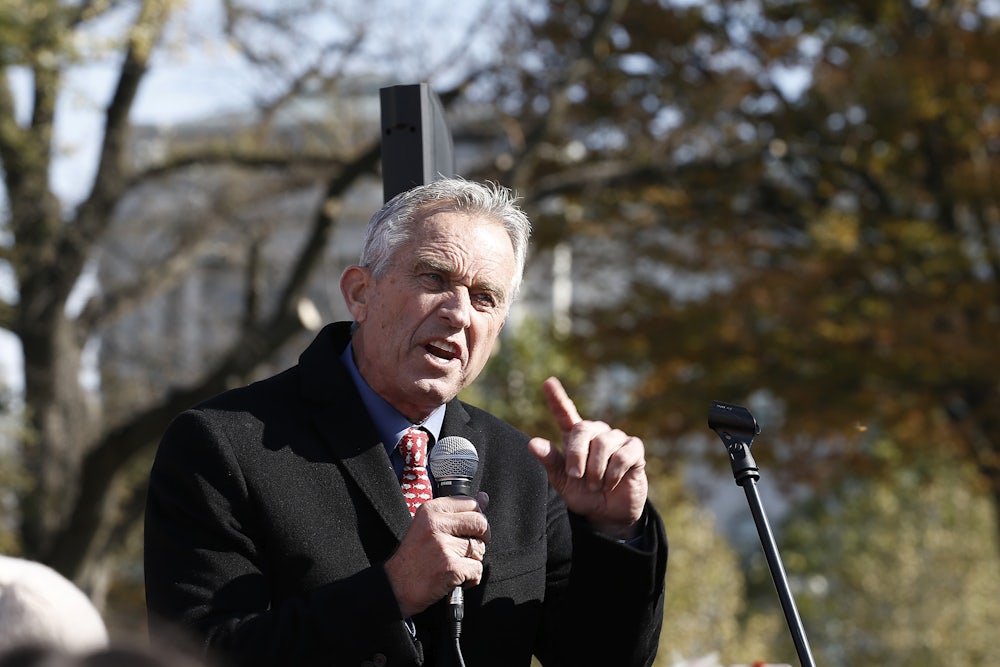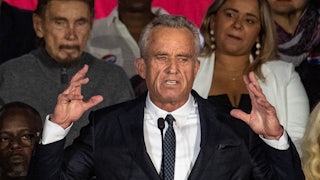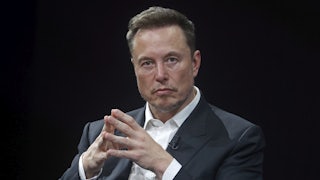A scene of squalor unfolds as the camera moves along a city street lined with apparent drug addicts to the soundtrack of Childish Gambino’s “This Is America.” A caption reads, “While American citizens live on the streets and take drugs not to feel the pain, the United States would rather finance a proxy war against Russia,” while a bar graph says the U.S. has sent $46.6 billion in military aid to Ukraine.
The video, on TikTok, is but one of the countless posts across social media that convey the same underlying message: By helping Ukraine defend itself from bloody subjugation by Russia, the U.S. is depriving its own citizens of critical aid. This pernicious narrative has spread in part thanks to fringe yet popular media and political figures who already had a history of littering the discourse with Kremlinesque talking points, and who now have weaponized and monetized the perception that the U.S. has been too generous to Ukraine and too stingy to its own people.
Among them is Glenn Greenwald, whose Substack has more than 300,000 subscribers and whose online talk show, System Update, draws hundreds of thousands of views. In December, on Tucker Carlson’s since-canceled Fox News show, Greenwald said, “I’ve been asking since February, in what conceivable way will the lives of American citizens be materially improved? How will you or your family’s lives be protected or fostered by sending tens of billions of dollars, now in excess of $100 billion, for the war in Ukraine?”
Jimmy Dore, whose YouTube show has more than 1.2 million followers, was a featured speaker at February’s Rage Against the War Machine rally in Washington. There, he criticized the “over $100 billion” sent to Kyiv, telling the crowd, “We could have spent that money saving lives with universal health care, but instead we spend that money taking lives overseas, which is our specialty.”
And then there’s Robert F. Kennedy Jr., the anti-vaxxer running a long-shot challenge to President Biden for the Democratic Party nomination. In his campaign announcement speech, Kennedy contrasted the “$113 billion committed to the Ukraine” with the “57 percent of Americans [who] can’t put their hand on $1,000 if they have an emergency,” “one-quarter of Americans [who] go to bed hungry,” and homeless veterans.
All three figures are peddling a false dichotomy and perverting the traditional guns-versus-butter debate, but their message resonates with millions because it plays into genuine anger and frustration over economic inequality as well as concern and distaste for foreign entanglements, particularly in the wake of the Iraq War and misadventures in Libya, Syria, and Afghanistan. It’s especially salient in the context of polls indicating that Americans’ bipartisan support for aid to Ukraine, while still strong, has softened considerably, and amid a presidential campaign whose outcome could play a pivotal role in Ukraine’s ability to procure aid from the U.S., its strongest backer by far.
But are Greenwald and others merely interested in promoting anti-imperialism while advocating for America’s downtrodden, or are they bad-faith propagandizers for a psychopathic dictator? The evidence is unfavorable to them.
Jimmy Dore regularly parrots Russian canards like the claim that Ukraine’s 2014 Revolution of Dignity was a U.S.-backed “coup”—a flat-out lie that the Kremlin lobbed as a false accusation after the revolution and that has since become a key pro-Russian propaganda talking point to discredit Ukraine’s government. Greenwald, in a video last month, said, “We’re not in Ukraine to help the Ukrainian people. The real reason we’re in Ukraine is … to sacrifice Ukraine, to destroy Ukraine in order to bleed Russia.” And RFK Jr., in a May interview with UnHerd, called the conflict “a U.S. war against Russia, to essentially sacrifice the flower of Ukrainian youth in an abattoir of death and destruction for the geopolitical ambition of the neocons, oft-stated, of regime change for Vladimir Putin and exhausting the Russian military so that they can’t fight anywhere else in the world.”
Dore’s, Greenwald’s, and Kennedy’s willingness to parrot Kremlin disinformation designed to justify an unprovoked invasion exposes the disingenuousness of their appeals to economic populism. They’re projecting Russia’s imperial aims onto the West by characterizing the invasion as a U.S. “proxy war” and portraying Ukrainians as mindless puppets of the West. A look at what Russia is actually doing to Ukraine exposes these American charlatans’ moral hollowness.
Putin’s armies have invaded a sovereign country, enthusiastically committing atrocities worthy of the Axis powers in World War II: destroying civilian infrastructure like apartment buildings and dams, committing genocidal massacres, kidnapping children, and castrating Ukrainian prisoners of war to render them infertile. And it’s all to fulfill the fantasies of a revanchist dictator who, contrary to the excuses one hears about “NATO expansion,” has telegraphed his intentions for years: denying Ukrainian statehood, comparing himself to Peter the Great, and lamenting the 1991 Soviet collapse—and by extension the independence of 14 indigenous nations after centuries of Russian colonial domination—as “the greatest geopolitical catastrophe” of the twentieth century and the end of “historical Russia.”
In this context, attempts to paint the West and Ukraine as the aggressors in the war and then undermine support for aid to Ukraine through phony economic arguments are downright despicable. But it’s also disingenuous—or betrays a misunderstanding of how the government actually works—to suggest that money spent in one place necessarily could have been spent anywhere else.
The Council on Foreign Relations estimates we sent $76.8 billion in military, financial, and humanitarian aid to Ukraine between January 24, 2022, and February 24, 2023; $46.6 billion of that was military aid, so the aforementioned TikTok video got that part right, at least. Yes, that’s a huge sum of money that could go a long way toward addressing some of our nation’s most pressing social problems. Many Democrats in Washington undoubtedly would love to allocate such sums to helping Americans find housing, jobs, sobriety, and so on. Alas, most Republicans would oppose such an idea.
“Let’s say we’ve given $30 billion in arms to Ukraine—it’s simply not the case that if that $30 billion hadn’t been spent on Ukraine that it would have been spent on homelessness here,” said Charles Kupchan, a professor of international affairs and an expert on isolationism at Georgetown University. He pointed out, accurately, that many right-wing opponents of aid to Ukraine have consistently opposed domestic spending initiatives, including under the Biden administration.
Spending billions on Ukraine aid does not preclude us from spending billions more on domestic aid, and cutting the Ukraine budget to $0 would do nothing to solve our social problems. Moreover, scapegoating Ukraine for America’s embarrassingly threadbare social safety net and paltry investment in public goods and services raises the question of how many other industrialized nations have been able to provide aid to Ukraine while still maintaining universal health care systems, low levels of poverty, and generally providing a good quality of life for their citizens. The $76.8 billion in aid to Ukraine, per the CFR’s estimate, accounts for only about one-third of a percent of our gross domestic product. The U.K.’s $10.6 billion amounts to a similar percentage of their GDP, while Poland’s $3.8 billion accounts for more than half a percent of theirs.
In other words, we have plenty of money to provide aid to Ukraine and at the same time provide for our own people. The reason we don’t do the latter, not sufficiently anyway, is not because of military conflicts but because of decades of policy choices—like tax policies favoring the wealthy, housing policies that exacerbate homelessness, and health care policies that enabled a for-profit system at the expense of universal coverage.
Many Americans are rightfully angry and frustrated at the brutal unfairness of life in our country and our seeming inability to remedy it. But anger and frustration leading to rage and hopelessness make fertile ground for grifters offering convenient scapegoats, facile explanations, and simple solutions. That’s a big part of how we wound up with Donald Trump as president.
Stopping aid to Ukraine and letting Russia conquer the country would solve exactly none of America’s problems—and Dore, Greenwald, Kennedy, and their ilk surely know this. But their careers depend on monetizing despair, keeping their followers so consumed with anger that they can’t see that our domestic woes have nothing to do with Ukraine. If their message spreads, though, Ukraine may end up being a casualty of the ignorance and populist rage that have made these men into millionaires.






